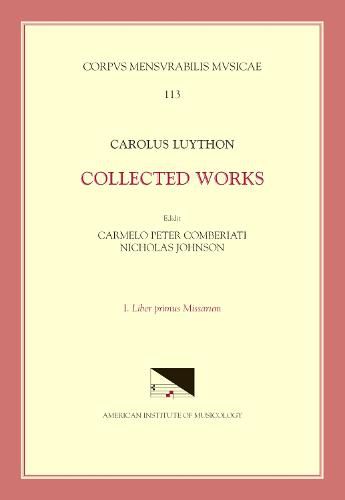Readings Newsletter
Become a Readings Member to make your shopping experience even easier.
Sign in or sign up for free!
You’re not far away from qualifying for FREE standard shipping within Australia
You’ve qualified for FREE standard shipping within Australia
The cart is loading…






Carolus Luython (ca. 1557–1620) spent most of his career as organist and composer at the Habsburg Imperial court in Vienna and Prague in the chapels of the Holy Roman Emperors Maximilian II and Rudolf II. His work is representative of the techniques of the late Renaissance, including examples of the expanded harmonic palette, as well as the alteration of imitative counterpoint and post-Palestrinian homophonic textures typical of the Counter Reformation. Luython is known for his instrumental works for keyboard, the well-documented conflict he had with Albrecht Rudner in the rebuilding of the Prague Cathedral organ between 1581 and 1590, and for his clavicimbalum universal, which after a visit to Luython, Michael Praetorius described in Syntagma Musicum, vol. 2, De Organographia (Wolfenbuttel: Elias Holwein, 1618) as having nineteen notes to the octave. Luython’s major published vocal works comprise most of his oeuvre and include a book of five-voice madrigals on texts by Petrarch (Venice: Angelo Gardano, 1582), a collection of six-voice motets (Prague: George Nigrinus, 1587), a collection of six-voice sacred songs (Prague: George Nigrinus, 1603), a six-voice set of Lamentations for the Prophet Jeremiah (Prague: George Nigrinus, 1604), and a book of nine polyphonic Mass Ordinaries for three to seven voices (Prague: N. Straus, 1609). His works represent a broad cross section of genres in Vienna and Prague and how the tastes of these important Northern courts for Italian musical models was realized locally at the highest level and rewarded. Luython’s last published music, the Liber primus Missarum (Prague, 1609), contains nine polyphonic settings of the Ordinary of the Mass, which demonstrate cantus firmus and parody techniques based upon significant sacred and secular models available to the chapel. The collection pays homage to Luython’s mentor, Philippe de Monte, in the parody works and to Emperor Rudolf II in the seven-voice dedication Mass based upon a non-liturgical text that could represent a hermetic synthesis between astrological and mystical elements that were current in court culture. The collection also includes four settings identified as Quodlibet Masses by Luython, which were derived from unidentified models and constructed in a technique similar to the parody masses. For more information, see http: //www.corpusmusicae.com/cmm/cmm\_cc113.htm
$9.00 standard shipping within Australia
FREE standard shipping within Australia for orders over $100.00
Express & International shipping calculated at checkout
Carolus Luython (ca. 1557–1620) spent most of his career as organist and composer at the Habsburg Imperial court in Vienna and Prague in the chapels of the Holy Roman Emperors Maximilian II and Rudolf II. His work is representative of the techniques of the late Renaissance, including examples of the expanded harmonic palette, as well as the alteration of imitative counterpoint and post-Palestrinian homophonic textures typical of the Counter Reformation. Luython is known for his instrumental works for keyboard, the well-documented conflict he had with Albrecht Rudner in the rebuilding of the Prague Cathedral organ between 1581 and 1590, and for his clavicimbalum universal, which after a visit to Luython, Michael Praetorius described in Syntagma Musicum, vol. 2, De Organographia (Wolfenbuttel: Elias Holwein, 1618) as having nineteen notes to the octave. Luython’s major published vocal works comprise most of his oeuvre and include a book of five-voice madrigals on texts by Petrarch (Venice: Angelo Gardano, 1582), a collection of six-voice motets (Prague: George Nigrinus, 1587), a collection of six-voice sacred songs (Prague: George Nigrinus, 1603), a six-voice set of Lamentations for the Prophet Jeremiah (Prague: George Nigrinus, 1604), and a book of nine polyphonic Mass Ordinaries for three to seven voices (Prague: N. Straus, 1609). His works represent a broad cross section of genres in Vienna and Prague and how the tastes of these important Northern courts for Italian musical models was realized locally at the highest level and rewarded. Luython’s last published music, the Liber primus Missarum (Prague, 1609), contains nine polyphonic settings of the Ordinary of the Mass, which demonstrate cantus firmus and parody techniques based upon significant sacred and secular models available to the chapel. The collection pays homage to Luython’s mentor, Philippe de Monte, in the parody works and to Emperor Rudolf II in the seven-voice dedication Mass based upon a non-liturgical text that could represent a hermetic synthesis between astrological and mystical elements that were current in court culture. The collection also includes four settings identified as Quodlibet Masses by Luython, which were derived from unidentified models and constructed in a technique similar to the parody masses. For more information, see http: //www.corpusmusicae.com/cmm/cmm\_cc113.htm